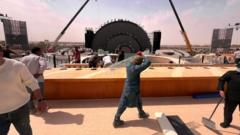Reports reveal alarming trends of migrant worker fatalities as the nation gears up for the upcoming 2034 World Cup, prompting calls for improved safety measures.
Surge in Migrant Worker Deaths Raises Alarm Ahead of Saudi World Cup 2034

Surge in Migrant Worker Deaths Raises Alarm Ahead of Saudi World Cup 2034
Human rights organizations voice concerns over hazardous conditions leading to deaths of migrant laborers in Saudi Arabia.
Human rights organizations are sounding the alarm over a rise in fatalities among migrant construction workers in Saudi Arabia, raising urgent concerns as the country prepares to host the World Cup in 2034. Reports published by Human Rights Watch and FairSquare reveal that workers are dying from preventable workplace accidents, with many deaths falsely categorized as natural causes, leaving grieving families without compensation.
The 2034 Saudi World Cup is set to be among the largest and most expensive, with millions of migrant laborers tasked with constructing extensive infrastructure, including 11 new stadiums, a major rail network, and 185,000 hotel rooms. Minky Worden, director of Global Initiatives at Human Rights Watch, emphasizes the potential peril, stating, “It could also have the highest cost in human lives.”
These shocking warnings follow closely behind a visit from FIFA President Gianni Infantino and former President Donald Trump to attend a US-Saudi investment forum, intensifying scrutiny on FIFA’s role in worker safety. While FIFA asserts its commitment to human rights, Human Rights Watch criticizes the organization for neglecting lessons learned from prior migrant worker tragedies during the Qatar World Cup in 2022.
Data on migrant workforce fatalities remains elusive due to restrictive access for rights groups and a ban on labor unions. Nonetheless, Human Rights Watch has gathered testimonies from families of 31 workers from Bangladesh, India, and Nepal who experienced fatal accidents including falls, electrocutions, and being trapped by heavy machinery. The sweltering heat compounding construction hazards further raises alarms as work accelerates ahead of the tournament.
Highlighting individual tragedies, the recent death of Pakistani foreman Muhammad Arshad, who fell from a construction site in Al Khobar, marks the first incident directly linked to World Cup preparations. Despite the Saudi government claiming improvements in occupational health and safety, rights advocates like the Building and Wood Workers’ International (BWI) cite a troubling increase in preventable accidents stemming from negligence and insufficient oversight.
Compounding the crisis, medical authorities in Saudi Arabia seldom conduct autopsies to ascertain causes of worker deaths, a point raised by FairSquare. No viable mechanisms appear to exist to protect the rights of hundreds of thousands of migrant workers who face grave risks in a compromised labor system.
James Lynch of FairSquare criticizes FIFA's human rights policies as insincere, noting that while Saudi Arabia’s reputation is polished, families in South Asia endure the devastating loss of fathers without understanding the circumstances of their deaths.
Despite FIFA’s announcement of plans to create a workers’ welfare system with mandatory standards for construction related to the World Cup, the specifics of this initiative remain vague. Human rights organizations insist that all worker deaths must be thoroughly investigated, advocating for dignified treatment of families and timely compensation for their losses.
As this situation unfolds, the spotlight increasingly falls on Saudi authorities and FIFA to uphold a commitment to the welfare of migrant workers in a nation preparing for one of football’s most significant events in history.
The 2034 Saudi World Cup is set to be among the largest and most expensive, with millions of migrant laborers tasked with constructing extensive infrastructure, including 11 new stadiums, a major rail network, and 185,000 hotel rooms. Minky Worden, director of Global Initiatives at Human Rights Watch, emphasizes the potential peril, stating, “It could also have the highest cost in human lives.”
These shocking warnings follow closely behind a visit from FIFA President Gianni Infantino and former President Donald Trump to attend a US-Saudi investment forum, intensifying scrutiny on FIFA’s role in worker safety. While FIFA asserts its commitment to human rights, Human Rights Watch criticizes the organization for neglecting lessons learned from prior migrant worker tragedies during the Qatar World Cup in 2022.
Data on migrant workforce fatalities remains elusive due to restrictive access for rights groups and a ban on labor unions. Nonetheless, Human Rights Watch has gathered testimonies from families of 31 workers from Bangladesh, India, and Nepal who experienced fatal accidents including falls, electrocutions, and being trapped by heavy machinery. The sweltering heat compounding construction hazards further raises alarms as work accelerates ahead of the tournament.
Highlighting individual tragedies, the recent death of Pakistani foreman Muhammad Arshad, who fell from a construction site in Al Khobar, marks the first incident directly linked to World Cup preparations. Despite the Saudi government claiming improvements in occupational health and safety, rights advocates like the Building and Wood Workers’ International (BWI) cite a troubling increase in preventable accidents stemming from negligence and insufficient oversight.
Compounding the crisis, medical authorities in Saudi Arabia seldom conduct autopsies to ascertain causes of worker deaths, a point raised by FairSquare. No viable mechanisms appear to exist to protect the rights of hundreds of thousands of migrant workers who face grave risks in a compromised labor system.
James Lynch of FairSquare criticizes FIFA's human rights policies as insincere, noting that while Saudi Arabia’s reputation is polished, families in South Asia endure the devastating loss of fathers without understanding the circumstances of their deaths.
Despite FIFA’s announcement of plans to create a workers’ welfare system with mandatory standards for construction related to the World Cup, the specifics of this initiative remain vague. Human rights organizations insist that all worker deaths must be thoroughly investigated, advocating for dignified treatment of families and timely compensation for their losses.
As this situation unfolds, the spotlight increasingly falls on Saudi authorities and FIFA to uphold a commitment to the welfare of migrant workers in a nation preparing for one of football’s most significant events in history.





















